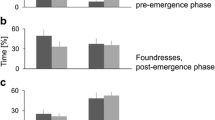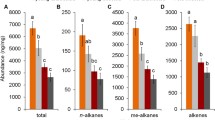Abstract
Many factors contribute to the success of a socially parasitic strategy, especially the ability of the parasite to invade a host colony. However, little research has focused on the choices that may be made by an invading parasite, specifically whether parasites actively discriminate between different host colonies and if they have a preference for colonies of a particular size. When an allodapine social parasite, Inquilina schwarzi, was presented with colonies of their host species, Exoneura robusta, the parasites were found to invade the larger host colonies. However, it could not be ascertained from this study whether the parasites were making an active decision concerning which colony to invade, or whether they were simply more attracted to the larger colonies due to potentially stronger odour cues. Regardless of the cause, the larger host colonies are more at risk of being invaded by a social parasite, which would give parasites greater resources for exploitation and could also provide selection against the large host colony sizes.
Similar content being viewed by others
References
Batra SWT, Sakagami SF, Maeta Y (1993) Behavior of the Indian allodapine bee Braunsapis kaliago, a social parasite in the nest of B. mixta (Hymenoptera: Anthophoridae). J Kans Entomol Soc 66:345–360
Cervo R, Turillazzi S (1996) Host nest preference and nest choice in the cuckoo paper wasp Polistes sulcifer (Hymenoptera: Vespidae). J Insect Behav 9:297–306
Cervo R, Bertocci F, Turillazzi S (1996) Olfactory cues in host nest detection by the social parasite. Behav Process 36:213–218
Chenoweth LB, Tierney SM, Smith JA, Cooper SJB, Schwarz MP (2007) Social complexity in bees is not sufficient to explain lack of reversions to solitary living over long time scales. BMC Evol Biol 7:246–255
Fisher RM (1984) Recognition of host nest odour by the bumblebee social parasite Psithyrus ashtoni (Hymenoptera: Apidae). N Y Entomol Soc 91:503–507
Hogendoorn K, Zammit J (2001) Benefits of cooperative breeding through increased colony survival in an allodapine bee. Insectes Soc 48:392–397
Lenoir A, D’Ettorre P, Errard C (2001) Chemical ecology and social parasitism in ants. Annu Rev Entomol 46:573–599
Michener CD (1961) A new parasitic genus of Ceratinini from Australia. J Kans Entomol Soc 34:178–180
Michener CD (1963) Biological observations on the primitively social bees of the genus Allodapula in the Australian region (Hymenoptera: Xylocopainae). Insectes Soc 9:355–373
Michener CD (1965) The life cycle and social organization of bees of the genus Exoneura and their parasite, Inquilina (Hymenoptera: Xylocopinae). Univ Kans Sci Bull 9:317–358
Michener CD (1970) Social parasites among African allodapine bees (Hymenoptera: Anthophoridae, Ceratinini). Zool J Linn Soc 49:199–215
Michener CD (1971) Biologies of African allodapine bees (Hymenoptera: Xylocopinae). B Am Mus Nat Hist 145:223–301
Michener CD (2000) The bees of the world. John Hopkins University Press, Baltimore
Reyes SG, Michener CD (1990) Observations on a parasitic allodapine bee and its hosts in Java and Malaysia. Trop Zool 3:139–149
Schmid-Hempel P (1998) Parasites in social insects. Princeton University Press, Princeton
Schwarz MP (1988) Intra-specific mutualism and kin-association of cofoundresses in allodapine bees (Hymenoptera: Anthophoridae). Monit zool Ital 22:245–254
Schwarz MP (1994) Female-biased sex ratios in a facultatively social bee and their implications for social evolution. Evolution 48:1684–1697
Schwarz MP, Bull NJ, Hogendoorn K (1998) Evolution of sociality in the allodapine bees: a review of sex allocation, ecology and evolution. Insectes Soc 45:349–368
Schwarz MP, Richards MH, Danforth BN (2007) Changing paradigms in insect social evolution: insights from halictine and allodapine bees. Annu Rev Entomol 52:127–150
Smith JA (2007) Facultative social parasitism in the allodapine bee Macrogalea berentyensis. Insect Sci 14:65–69
Smith JA, Schwarz MP (2006a) Strategic parasitic exploitation in a socially parasitic bee: a benefit in waiting? Behav Ecol Sociobiol 60:108–115
Smith JA, Schwarz MP (2006b) Sociality in a malagasy allodapine bee, Macrogalea antanosy, and the effect of Macrogalea maizina, its facultative social parasite. Insectes Soc 53:101–107
Smith JA, Tierney SM, Park YC, Fuller S, Schwarz MP (2007) Origins of social parasitism: the importance of divergence ages in phylogenetic studies. Mol Phyl Evol 43:1131–1137
Tierney SM, Schwarz MP, Adams M (1997) Social behaviour in an Australian allodapine bee Exoneura (Brevineura) xanthoclypeata. Aust J Zool 45:385–398
Acknowledgments
We thank Meg Schwarz and Sally Harradine for help with fieldwork and nest processing, Theresa Wossler for advice on a previous version of this manuscript, as well as the Holsworth Wildlife Research Fund (grant awarded to J. Smith) and the Australian Research Council (grant awarded to M. Schwarz) for the financial support required for this research.
Author information
Authors and Affiliations
Corresponding author
About this article
Cite this article
Smith, J.A., Schwarz, M.P. Decisions, decisions, decisions: the host colony choices of a social parasite. J Ethol 27, 385–389 (2009). https://doi.org/10.1007/s10164-008-0131-y
Received:
Accepted:
Published:
Issue Date:
DOI: https://doi.org/10.1007/s10164-008-0131-y




